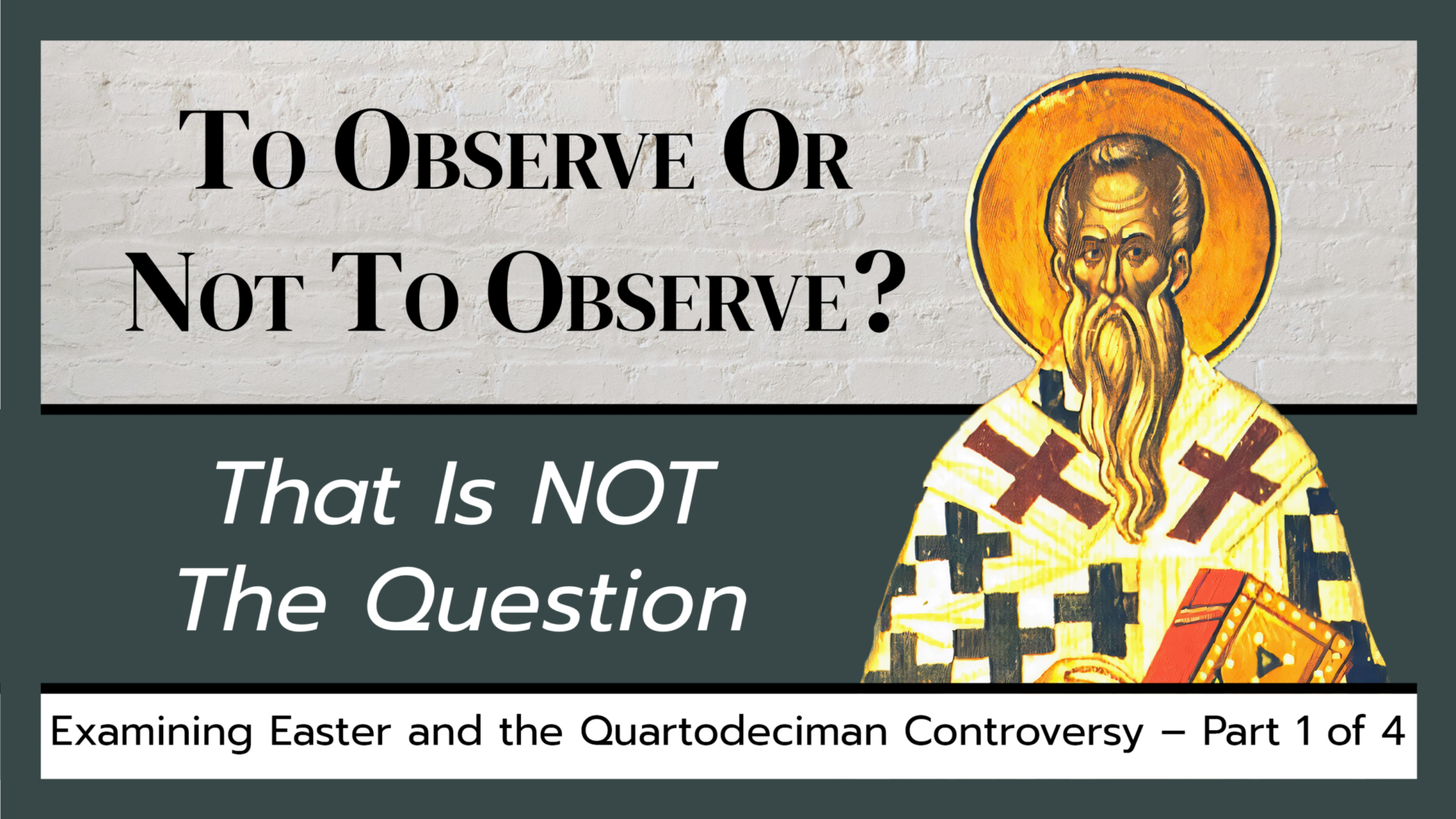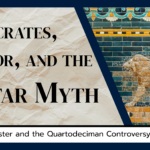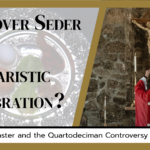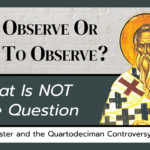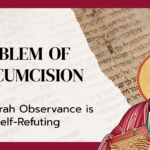Easter Sunday has historically been considered by Christians to be the pinnacle of the liturgical year. It is the culmination of more than a month of prayer and fasting, and commemorates the most important event in the history of Christianity: the resurrection of Jesus Christ. Unfortunately, some dispute that this is the actual reason for this holiday. Many assert that it is ancient paganism, not Christianity, that is the real source of the festivities.
There are usually two different components to this claim, one which atheists and anti-Christians commonly circulate, and another which is more unique to the Torah Observant movement:
- Easter Sunday is supposedly derived from a celebration in honor of the Babylonian goddess Ishtar, and the word Easter is said to be derived from her name. Rabbits and eggs are claimed to have been symbols of Ishtar, because she was a fertility goddess, and this is where the Easter Bunny and Easter Eggs supposedly come from.
- The early Church is claimed to have continued to celebrate the Jewish festival of Passover well into the 2nd century until the “evil Emperor Constantine” supposedly abolished the practice at the Council of Nicea in 325 AD because of his “intense hatred for Jews”. This is when the Church is said to have adopted the pagan Ishtar celebration known as Easter.
The first several parts of this series will be focused on addressing claim #2 and showing that the debate in the early Church was NOT about a pagan holiday replacing the Jewish Passover, but was mostly just a calendar dispute. In addition, I will show that the Council of Nicea did not play quite as large of a role in this debate as is often claimed, and Constantine did not institute “Easter Sunday”.
Next, I will briefly talk about claim #1 and provide conclusive evidence that this is false as well. By the end of this series, it will be abundantly clear that Easter is an entirely Christian holiday, and all claims to the contrary are based on historical myths, out-of-context quotes, and misinformation.
Let’s get into it!
The Quartodeciman Controversy
In the 2nd and 3rd centuries, a debate arose in the Church about when Christ’s Passion should be celebrated. This debate is now referred to as “the Quartodeciman controversy”, and it is frequently misunderstood.
In this section, I’m going to respond to a portion of an article entitled “Polycrates, the Gospel, and the Torah” found on the website of the “House of David Fellowship” founded by Lee Miller. There is no direct attribution of authorship in this article, so I’m going to assume Miller himself wrote it. In this article, the Quartodeciman controversy is looked at, and it is characterized as a question of “to observe Passover or not to observe Passover”, but as I intend to show, this isn’t the case at all.
Polycarp vs. Anicetus
Now, there are a few different places I could start the story, but I think the best place to start is around 150 AD, when Polycarp went to Rome to visit with Pope Anicetus. Here’s what Lee Miller says in the article,
A controversy had arisen concerning the keeping of Passover. The Roman church had stopped observing it so Polycarp went to visit Anicetus to discuss the matter. During their discussion, Anicetus attempted to persuade Polycarp to stop following the teachings he had learned from the apostles and John, the disciple of our Lord, and to start following a tradition that had begun once Gentile bishops took the reigns of leadership in Jerusalem (after 135 CE). Polycarp refused. On the flip side, Polycarp attempted to persuade Anicetus to go back to the teachings of the apostles but Anicetus said he was bound to adhere to the traditions that had been recently established by the presbyters who preceded him there in Rome.
So there is a lot going on here. First of all, let’s talk about the primary sources where we find this recounted. Earlier in his article, Miller points us to Irenaeus’ Against Heresies Book III, Chapter 3, Paragraph 4. Now, Irenaeus was a disciple of Polycarp, and he does mention Polycarp’s trip to Rome in this passage, but sadly, he does not elaborate on what Polycarp and Pope Anicetus discussed.
Here’s the relevant part of Paragraph 4 (I encourage you to click through and read the rest of the paragraph if you’re interested):
…To these things [that Polycarp was instructed by the apostles] all the Asiatic Churches testify, as do also those men who have succeeded Polycarp down to the present time — a man who was of much greater weight, and a more steadfast witness of truth, than Valentinus, and Marcion, and the rest of the heretics. He it was who, coming to Rome in the time of Anicetus caused many to turn away from the aforesaid heretics to the Church of God, proclaiming that he had received this one and sole truth from the apostles — that, namely, which is handed down by the Church…
Irenaeus, Against Heresies (Book III, Chapter 3, Paragraph 4)
Was Pope Anicetus A Heretic?
Now, already we have something interesting to explore. Irenaeus hasn’t told us what was discussed between Anicetus and Polycarp, but he does tell us what else Polycarp did while he was in Rome. Namely, he “caused many to turn away from the aforesaid heretics to the Church of God”. Now, given the context of the passage it should be clear whom the heretics Irenaeus is referring to are, but in the interests of countering all possible objections, I want to give a few reasons why Irenaeus clearly does not include Pope Anicetus among them.
1. Irenaeus Tells Us Who The Heretics Are
Irenaeus mentions in the preceding sentence “Valentinus, and Marcion, and the rest of the heretics”, so already we should have a baseline for who he’s referring to. Valentinus and Marcion were Gnostics. They believed that the “God of the Jews” was a completely different entity than the God Christians believed in. They called Him the “Demiurge” and believed that He was the evil adversary of the One True God. They also believed He was the Creator of the physical world, and therefore anything physical was evil. Marcion went so far as to completely reject the entire Old Testament because of this belief.
Having mentioned Valentinus and Marcion, Irenaeus then refers to “the aforesaid heretics” in the very next sentence. Who is he referring to? The most logical explanation would be that he’s referring to them and others who agree with them.
2. Irenaeus Holds The Bishops Of Rome In High Regard
Secondly, earlier in Chapter 3 Irenaeus lays out the succession of Roman Bishops going back to Peter, and he says some curious things about them that make it entirely implausible to believe that he considered Anicetus a heretic. Here’s what he says in Paragraph 2 (emphasis mine):
Since, however, it would be very tedious, in such a volume as this, to reckon up the successions of all the Churches, we do put to confusion all those who, in whatever manner, whether by an evil self-pleasing, by vainglory, or by blindness and perverse opinion, assemble in unauthorized meetings; [we do this, I say,] by indicating that tradition derived from the apostles, of the very great, the very ancient, and universally known Church founded and organized at Rome by the two most glorious apostles, Peter and Paul; as also [by pointing out] the faith preached to men, which comes down to our time by means of the successions of the bishops. For it is a matter of necessity that every Church should agree with this Church, on account of its preeminent authority.
Irenaeus, Against Heresies (Book III, Chapter 3, Paragraph 2)
He then lists all of the Roman Bishops in paragraph 3. After Peter, the Bishops in order were:
- Linus
- Anacletus
- Clement
- Evaristus
- Alexander
- Sixtus
- Telephorus
- Hyginus
- Pius
- Anicetus
- Soter
- Eleutherius
And then, at the very end of paragraph 3, Irenaeus says (emphasis mine):
In this order, and by this succession, the ecclesiastical tradition from the apostles, and the preaching of the truth, have come down to us. And this is most abundant proof that there is one and the same vivifying faith, which has been preserved in the Church from the apostles until now, and handed down in truth.
Irenaeus, Against Heresies (Book III, Chapter 3, Paragraph 3)
So Irenaeus is saying a few things:
- There are too many bishops in the world to list all of them, so I’m only going to list the succession of the Bishops of Rome.
- The Roman Church is the most important Church because it has “preeminent authority”.
- Through the Bishops of Rome the “tradition from the apostles” has been “handed down in truth”.
- Anicetus was a Bishop of Rome.
Now, to fully expound on the implications of Irenaeus’ beliefs about the Bishop of Rome would be beyond the scope of this article, but the key takeaway for our purposes is this: Irenaeus believes that the succession of Roman Bishops has faithfully transmitted the apostolic faith, and he includes Anicetus in that list. Therefore, unless he specifically states anything to the contrary, it is safe to conclude that Irenaeus does not believe Anicetus is a heretic.
There are a few more pieces of evidence to indicate that Anicetus was not considered a heretic, but I will address those later on in the article.
The Story of Polycarp and Anicetus
So having examined the reference Mr. Miller gives for the story of Polycarp’s encounter with Anicetus, let’s look elsewhere and find out what else we can learn about the story.
It turns out that the only detailed account of this event we have comes from the 4th-century church historian Eusebius of Caesarea. In his Church History, Eusebius records a letter that Irenaeus wrote to Pope Victor, wherein he recounts the story. I will look at the rest of Irenaeus’ letter to Victor later, as well as the context surrounding it, but for now let’s just look at the portion pertaining to Polycarp and Anicetus:
And when the blessed Polycarp was at Rome in the time of Anicetus, and they disagreed a little about certain other things, they immediately made peace with one another, not caring to quarrel over this matter. For neither could Anicetus persuade Polycarp not to observe what he had always observed with John the disciple of our Lord, and the other apostles with whom he had associated; neither could Polycarp persuade Anicetus to observe it as he said that he ought to follow the customs of the presbyters that had preceded him.
But though matters were in this shape, they communed together, and Anicetus conceded the administration of the eucharist in the church to Polycarp, manifestly as a mark of respect. And they parted from each other in peace, both those who observed, and those who did not, maintaining the peace of the whole church.”
Eusebius, Church History (Book V, Chapter XXIV, Paragraphs 16-17)
So, if we just read this section, we get a little bit more information about what Polycarp and Anicetus disagreed upon, but not much more. We still don’t have enough information to determine whether this was a debate about “to observe Passover or not to observe Passover” or something else entirely.
Here are all the things we can deduce from this, though:
1. The Debate Was Over A Certain Observance
Anicetus was unable to persuade Polycarp to stop observing “what he had always observed”. Likewise, Polycarp was unable to persuade Anicetus to observe it. That is all we can discover from this passage. Of course, this begs the question “what is the observance?”
This passage doesn’t tell us, but there is other information in Eusebius that I will go over later in the article, which should give us a better understanding of what the actual debate was about.
2. They Agreed To Disagree
Polycarp and Anicetus disagreed, yet they did “not [care] to quarrel over this matter”. This immediately should tell us something about the debate they were having. Even if Mr. Miller is right, and they WERE arguing about whether or not to observe the Jewish Passover, then this demonstrates that observance of that feast (and by extension, any of the other feasts) is not a matter that should divide the Body of Christ.
Even if Polycarp WAS observing Passover according to the tradition handed down to him by the Apostle John, he did not feel it was important enough of an issue to break fellowship with Anicetus or call him a heretic. As Irenaeus says, “they parted from each other in peace”.
Torah Observant individuals should take note of this when they are promoting the Biblical Feasts. If you believe Polycarp was observing Passover but not even Polycarp felt it was important enough to divide the Church over it, then perhaps you should take a more tolerant view of Christians who do not share your convictions regarding the feasts, and “[maintain] the peace of the whole church”.
3. They Were Both Following Ancient Traditions
Polycarp was following a tradition that he got from the apostle John, while Anicetus was following a tradition he got from the “presbyters that preceded him”. This mostly aligns with what Mr. Miller said, except for one part. Miller said that Anicetus was following ” a tradition that had begun once Gentile bishops took the reigns of leadership in Jerusalem (after 135 CE)”. However, nowhere in this passage do we see anything about Gentile bishops vs. Jewish bishops.
Further down in his article, Mr. Miller cites the 4th century bishop Epiphanius to support this view.
Epiphanius makes reference to the first 15 bishops of the Jerusalem assembly.
Epiphanius – “. . . the controversy arose after the exodus of the bishops of the circumcision (135) and it has continued until our time (315 – 403).”
False Quote?
Now, the problem is that this quote is incomplete. It makes reference to “the controversy” but doesn’t specify what controversy we’re talking about. In fact, during my search to track down this quote, I found several other Torah Observant websites claiming it was about other controversies. For instance, here and here are several articles claiming it’s about a change in the way the weekly sabbath was calculated.
To compound the problem, Mr. Miller does not give us the citation for where Epiphanius said this, so I had to look elsewhere to find the reference. Unfortunately, the only citation I found (HE4, 6, 4) does not match any of Epiphanius’ writings. Additionally, nearly every time I found someone using this quote, it was phrased slightly differently, indicating that it was not a direct quote at all, but a paraphrase. Several times, lengthy phrases were added to the quote without proper indication that this had been done.
So ultimately, I went searching through Epiphanius’ most famous work, the Panarion, to see if he ever said anything like this regarding the Quartodeciman controversy.
Ancient Disagreements
It turns out that Epiphanius does have quite an extensive chapter on the Quartodeciman controversy, but the quote Mr. Miller references is found in a chapter about the Audians. I’m not going to get into a discussion of everything the Audians believed, but essentially the Audians alleged that the Church changed the date of “the Paschal feast” to coincide with the Emperor Constantine’s birthday. Here’s how Epiphanius answered this charge (emphasis mine):
9, 7 For long ago, even from the earliest days, its various celebrations in the church differed, occasioning ridicule every year, with some keeping it a week early and quarreling with the others, others a week late—some celebrating it in advance, some in between, others afterwards. (8) And in a word, as is not unknown to many scholarly persons, there was a lot of muddle and tiresomeness every time a controversy was aroused in the church’s teaching about this festival—as in the time of Polycarp and Victor the east was at odds with the west and they would not accept letters of commendation from each other. (9) But in as many other times—as in the time of Alexander, the bishop of Alexandria, and Criscentius, when each is found writing to the other and quarreling, and down to our own day. This has been the situation ever since < the church > was thrown into disorder after the time of the circumcised bishops. And so < bishops >, gathering then from every quarter and making a precise investigation, determined that the festival be celebrated with one accord, as befits its date and rite.
Epiphanius, Panarion , Books II and III (Anacephalaeosis VI, Audians, 9,7-9)
So according to Epiphanius, the Church had always disagreed about when to celebrate “this festival”. And he says that “writing to the other and quarreling” had been the situation since after the time of the Jewish bishops.
However, he does not say that there was one unified tradition during the time of the Jewish bishops, and then competing traditions arose after them. It is possible that this is the case, but at least according to the way Epiphanius describes it, these differences of observance existed “even from the earliest days”.
There’s much more that I could say about Epiphanius’ response to the Quartodeciman controversy (and the Audians), but I will save that for a different article.
To bring it back to the time of Polycarp, what we know is that both Polycarp and Anicetus were following traditions that had been handed down to them, and they both showed great respect for these traditions. In fact, they held these traditions in such great reverence that neither one of them felt they had the authority to set these traditions aside.
4. They Practiced “The Eucharist”
This aspect of the story is crucially important. Irenaeus said that Anicetus “conceded the administration of the Eucharist” to Polycarp. Since we’re trying to determine whether Polycarp observed the Jewish Passover, the suggestion will likely be made that “the Eucharist” which Irenaeus mentions is actually a Passover Seder. Whether or not you would posit that particular interpretation, it’s easy to gloss over this passage, or read anachronistic understandings into the text.
In the next part of this series, I’m going to examine some early Christian writings and find out what they really believed about “the Eucharist”.
Stay tuned!
